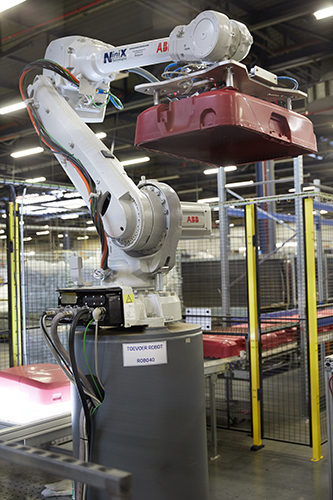World’s largest travel luggage company’s new science-based climate target will expand use of recycled materials while maintaining durability.
By Marina Dirks, Vice President, Global Head of Sustainability, Samsonite
Since 1910, Samsonite has been manufacturing premium quality luggage and durable bags to meet the needs of travelers and commuters everywhere. Our company operates a portfolio of customer-centric brands, including Samsonite, Tumi, and American Tourister, as well as several other complementary brands. Over our history, we have led the industry in using lighter, stronger new materials to create iconic designs while adapting to the evolving needs of our consumers.
Under the leadership of our CEO Kyle Gendreau, in 2020 we launched our comprehensive sustainability strategy called Our Responsible Journey. Building upon our 110-year heritage of innovation and underpinned by sound governance, our global sustainability strategy focuses on three pillars – Product, Planet, and People – to deliver on our vision to create a path towards a more sustainable future for the industry.
Samsonite is accelerating climate action by setting meaningful climate targets and implementing energy efficiency and renewable power initiatives. For example, we recently committed to an ambitious near-term, science-based climate target to:

The most sustainable product is the one that lasts. And designing durable, high-quality products that are easily repaired, rather than replaced, has long been a part of our company tradition. We aim to accelerate and scale the use of more sustainable materials in our products and packaging, moving further away from virgin fossil feedstock, improving circularity and lowering our carbon footprint.
To achieve our new target, Samsonite is focused on reducing material-related emissions in our global value chain by significantly increasing recycled content of the various types of plastics, aluminum, and other materials of which our products are made. We will continue to partner with our suppliers to significantly expand the use of recycled, lower-carbon materials.
For example, Samsonite’s Essens collection is the next generation of ‘Made in Europe’ 3-point-lock suitcases. The outer shell is produced with at least 70% post-consumer recycled polypropylene (PP) and the interior lining is made with over 95% post-consumer recycled polyethylene terephthalate (PET), while the wheels are designed to be easily taken apart, replaced and repaired by customers: all they need to remove them is a pen!
Building on this collection’s success, we launched the Essens Limited Edition, with one-third of the outer shell made from recycled suitcases, including pre-owned luggage customers brought to our stores. This initiative was an exciting opportunity to demonstrate the circularity of our products in a way that was particularly engaging for our consumers.
This year, the Samsonite Group’s global teams have built greenhouse gas emissions reduction roadmaps, specifying actions they will take to achieve the new 2030 target. The actions laid out in our roadmaps are based on our experience of incorporating recycled content into our products since we launched our first collection with recycled content in 2018. In 2023, products made at least in part from recycled materials accounted for around 34% of Samsonite’s net sales, up from about 23% in 2022. To achieve the emissions reductions, we look to further scale the use of recycled content – relying on solutions we’ve already brought to market.
To address emissions from our own operations, the Samsonite Group will maintain 100% renewable electricity across our retail stores, manufacturing and distribution facilities, and offices through a mix of onsite solar power generation, participation in utility and municipal green power programs, and purchases of Renewable Energy Certifications (RECs) and Energy Attribution Certificates (EACs). We will also continue to implement energy efficiency and decarbonization measures across all of Samsonite’s facilities.
Learn more about how our company is making a meaningful difference along our value chain for people and the planet in Samsonite’s 2023 Sustainability Report.

As the Samsonite Group’s Vice President and Global Head of Sustainability, Marina Dirks leads sustainability and ESG for the Group and its brands, including Samsonite, TUMI, American Tourister, and a number of smaller brands across North America, Asia, Europe, and Latin America. Marina started her career in sustainability consulting, advising blue chip companies across sectors globally how to embed environmental, social, and governance principles strategically and operationally across their businesses.
Prior to joining Samsonite, Marina was Director of Global Sustainability at Tiffany & Co., where she led the development of the luxury brand’s 2025 sustainability goals and oversaw sustainability reporting and various ESG issue areas. Marina completed an MBA exchange program at UNC Kenan-Flagler Business School in Chapel Hill, NC and holds a M.Sc. in Business & Economics from Stockholm School of Economics in Sweden and a B.A. in Business & Economics from Witten/Herdecke University in Germany.
Scott Ellyson, CEO of East West Manufacturing, brings decades of global manufacturing and supply chain leadership to the conversation. In this episode, he shares practical insights on scaling operations, navigating complexity, and building resilient manufacturing networks in an increasingly connected world.